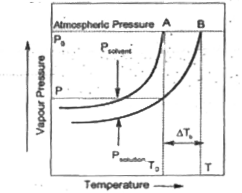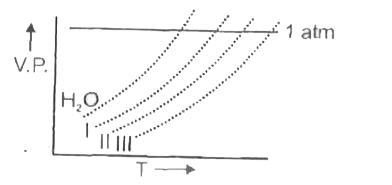If for a sucrose, elevation in boiling point is 1.0∘C, then what will be the boiling point of NaCl solution for same molal concentration?
1.0∘C
2.0∘C
3.0∘C
4.0∘C
The correct Answer is:B
To solve the problem, we need to understand the concept of boiling point elevation and how it relates to the Van't Hoff factor for different solutes.
1. Understand the given data:
We know that for a sucrose solution, the elevation in boiling point (ΔTb) is 1.0°C. Sucrose is a non-electrolyte, meaning it does not dissociate into ions when dissolved in a solvent. Therefore, its Van't Hoff factor (i) is 1.
2. Recall the formula for boiling point elevation:
The boiling point elevation can be calculated using the formula:
ΔTb=i⋅Kb⋅m
where:
- ΔTb = elevation in boiling point
- i = Van't Hoff factor (number of particles the solute dissociates into)
- Kb = ebullioscopic constant of the solvent
- m = molality of the solution
3. Apply the formula for sucrose:
For the sucrose solution, we have:
1.0=1⋅Kb⋅m
This means that Kb⋅m=1.0.
4. Consider the NaCl solution:
Now, we need to find the boiling point elevation for a NaCl solution at the same molal concentration. NaCl is an electrolyte and dissociates into two ions: Na⁺ and Cl⁻. Therefore, its Van't Hoff factor (i) is 2.
5. Apply the formula for NaCl:
For the NaCl solution, the boiling point elevation can be expressed as:
ΔTb=2⋅Kb⋅m
Since we know Kb⋅m=1.0 from the sucrose solution, we can substitute this into the equation:
ΔTb=2⋅1.0=2.0
6. Determine the boiling point of the NaCl solution:
The boiling point of the solution (Tb) can be calculated as:
Tb=Tb,pure solvent+ΔTb
Assuming the boiling point of the pure solvent (water) is 100°C:
Tb=100°C+2.0°C=102.0°C
Final Answer:
The boiling point of the NaCl solution at the same molal concentration is 102.0°C.
---
We know that for a sucrose solution, the elevation in boiling point (ΔTb) is 1.0°C. Sucrose is a non-electrolyte, meaning it does not dissociate into ions when dissolved in a solvent. Therefore, its Van't Hoff factor (i) is 1.
The boiling point elevation can be calculated using the formula:
ΔTb=i⋅Kb⋅m
where:
- ΔTb = elevation in boiling point
- i = Van't Hoff factor (number of particles the solute dissociates into)
- Kb = ebullioscopic constant of the solvent
- m = molality of the solution
For the sucrose solution, we have:
1.0=1⋅Kb⋅m
This means that Kb⋅m=1.0.
Now, we need to find the boiling point elevation for a NaCl solution at the same molal concentration. NaCl is an electrolyte and dissociates into two ions: Na⁺ and Cl⁻. Therefore, its Van't Hoff factor (i) is 2.
For the NaCl solution, the boiling point elevation can be expressed as:
ΔTb=2⋅Kb⋅m
Since we know Kb⋅m=1.0 from the sucrose solution, we can substitute this into the equation:
ΔTb=2⋅1.0=2.0
The boiling point of the solution (Tb) can be calculated as:
Tb=Tb,pure solvent+ΔTb
Assuming the boiling point of the pure solvent (water) is 100°C:
Tb=100°C+2.0°C=102.0°C
The boiling point of the NaCl solution at the same molal concentration is 102.0°C.
Topper's Solved these Questions
- SOLUTIONSBOOK - CENGAGE CHEMISTRY ENGLISHCHAPTER - SOLUTIONSEXERCISE - Exercise(Fill In The Blanks)
19 Videos
- SOLUTIONSBOOK - CENGAGE CHEMISTRY ENGLISHCHAPTER - SOLUTIONSEXERCISE - Exercise (True/False)
19 Videos
- SOLUTIONSBOOK - CENGAGE CHEMISTRY ENGLISHCHAPTER - SOLUTIONSEXERCISE - Exercise (Assertion-Reasoning)
18 Videos
- SOLID STATEBOOK - CENGAGE CHEMISTRY ENGLISHCHAPTER - SOLID STATEEXERCISE - Ex 1.2 (Objective)
9 Videos
- SURFACE CHEMISTRYBOOK - CENGAGE CHEMISTRY ENGLISHCHAPTER - SURFACE CHEMISTRYEXERCISE - Archives Subjective
2 Videos
Similar Questions
Boiling point elevation is
View SolutionConsider following figure and answer the questions at the end of it. Figure explains elevation in boiling point when a non-volatile solute is added to a solvent.

Variation of vapour pressure with temperature and showing elevation in boiling point.
Given that ΔTb is the elevation in boiling point of the solvent in a solution of molality m then Ltm→0(ΔTbm) is equal to
View Solution
Which is having highest elevation in boiling point?
View SolutionDefine Raoult's law for the elevation of boiling point of a solution.
View SolutionThe boiling point elevation contant for benzene is 2.57∘C/m. The boiling point of benzene is 81.0∘C. Determine the boiling point of a solution formed when 5g of C14H12 is dissolved I 15g fo benzene.
View SolutionThe boiling point of solution is ……..than the boiling point of pure solvent.
View SolutionThe molal elevation constant is the ratio of the elevation in boiling point to :
View SolutionFor the same solution the elevation in boiling point has higher values than depression in freezing point.
View SolutionThe boiling point of 0.1MKCl solution is ………..than 100∘C.
View SolutionAssertion (A): The elevation in boiling point for two isotonic solutions may not be same.
Reason (R ): The boiling point depends upon the concentration of the solute.
View Solution
